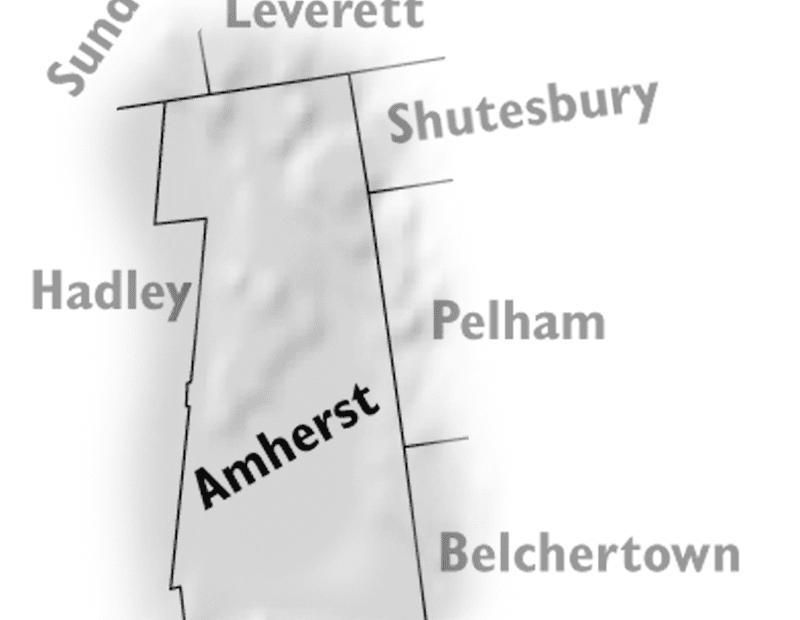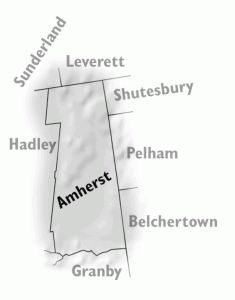
Doing Business In: Amherst
Textbook Example of Business in a College Town
In October of 2009, Reza Rahmani and Arash Hashemkhani opened a Persian/Mediterranean restaurant in Amherst named Moti. It was a dream come true for Rahmani, who fell in love with the town during his years at UMass Amherst and had always been intrigued by the idea of opening a downtown eatery.He was living in Phoenix, Ariz. when he finally found a site that suited his needs. “Two summers ago, I made the trip to Amherst four times to look for property,” he said.
So, when the space Moti now occupies became available, he and Hashemkhani rented it, then proceeded to gut it and renovate the entire interior.
Their restaurant has been so successful, they are expanding into space next door which recently became available. They are also gutting a large property on Boltwood Place with plans to turn it into a restaurant/lounge for working professionals.
“The rents here are equivalent to those in the back bay of Boston, but I love the demographics of this town; Amherst has a flavor you don’t find in many small towns, let alone bigger cities. There is a little bit of Europe here, especially uptown where our restaurant is located,” Rahmani said, adding that businesses are so supportive of each other that other restaurant owners have told customers to try Moti. “Within a year, we have built so many relationships, we almost feel we have been here our whole lives.”
Tony Maroulis, executive director of the Amherst Area Chamber of Commerce, says the restauranteurs’ experience is in line with the Chamber’s motto: “The Amherst area is a perfect place.”
“The student population of UMass, Amherst College, and Hampshire College are right in our backyard. We have a vibrant downtown and interesting village centers in several sections of town,” he said. “Thousands of people come here each year because of the colleges and cultural institutions. There are eight museums in town, and we also have a wonderful year-round population that is engaged with the community, which makes for a fertile business environment. These are just some of the reasons why Amherst is a terrific place to live and work.”
Robert Green agrees. Since 1976, he has owned and operated Amherst Typewriter and Computer, which is a few doors away from Moti.
“Amherst is a well-educated community, which is compatible with the services I perform,” he said. “There are many poets, writers, and artists as well as liberal arts students here who use typewriters because their senses are greater than that of the average person and the typewriter becomes an extension of them. To me, there is more than a monetary reward in owning a business here, because I serve several generations.”
For this, the latest installment of its Doing Business In series, BusinessWest takes a comprehensive look at Amherst and at why its chamber’s slogan is on the money.
Schools of Thought
Jeremy Austin moved J. Austin Antiques from Boston to Amherst in 2005. Since then, he has combined his business with J. Austin Jewelers, which his mother owns.
“This is a good, family-oriented community, but also a very intellectual, sophisticated community,” he said. “People who visit here are looking for things to do, which results in a lot of business potential because there is a steady influx of students and their parents as well as people from all over the world who come to Amherst to see the Emily Dickinson Museum.”
Amherst has 50 working farms, and Austin says the combination of a walkable downtown surrounded by land is another bonus. “People tend to pigeonhole this as a college town, but there is also a lot of open land here and good proximity to Boston and New York, as well as high-end restaurants,” he said.
Town Manager Larry Shaffer says town officials have done a remarkably good job of using resources offered by the Preservation of Agricultural Land Program to keep the rural landscape intact. In addition, the town recently adopted a new master plan with a goal of concentrating development in specific village centers.
“We want to preserve agricultural land by not encouraging traditional urban sprawl,” Shaffer said. “The village center concept is new for Amherst and is an attempt to compact development while retaining areas of conservation and open space.”
New development will be concentrated in pockets located throughout the town. They include Atkins Center, Cushman Village, Pomeroy Potwine Village Center, the intersection of College Street and South East Street, and Main Street and North East Street. “New zoning is being crafted and will be brought to the town meeting to be voted on,” Shaffer added.
Maroulis believes the changes will make make the town more sustainable. “It is a really exciting time to be here,” he said.
Shaffer agrees and adds that Amherst is a great place to do business. “It is virtually recession-proof, because the community is based on education. The university is a center of excellence in a number of academic disciplines and has one of the best engineering schools in the country, which offers businesses a splendid opportunity to work with them for complementary activities,” he said. “We are a small town, but absolutely committed to getting projects underway that are consistent with our zoning regulations and are in the best interests of the town.”
The town and its colleges have forged strong relationships, which are evident in many projects they have completed together. Currently, Amherst College is undertaking a $15 million restoration of the Lord Jeffery Inn, which will include a pub and an upscale restaurant.
And in recent weeks UMass signed over a piece of property to the town. The transaction, called the Gateway Project, involves a collaboration between the town and the university to redevelop a 1,500-foot stretch of North Pleasant Street. It will connect the northern end of the town center with the UMass campus and contain its own center that will include private student housing, private commercial development, lodging, parking, and space for UMass functions.
Jeffrey Guidera also sees potential in Amherst. In January 2008, he and contractor Rus Wilson formed Hills House LLC, a real-estate development venture established to restore a cluster of historically significant homes on the property of the Henry Hills mansion, which was the former home of the Boys & Girls Club of Amherst. “There is interest and demand for living space downtown. People like to have services that are concentrated in one area. So, we are saving these old homes and providing new ones for people,” said Guidera.
He believes there is real opportunity for business growth in town. “This is due to the combination of the regulatory environment, zoning changes, and the mood of the population, who realize they need a more diversified tax base,” he said, adding that greater housing density will help promote growth.
Kyle Wilson and David Williams are about to break ground for a new, five-story structure situated directly behind the popular Judie’s restaurant on North Pleasant Street. The new building is slated for mixed use, with a dozen high-end residential apartments on floors two through five and retail/professional space on the first floor along with storage space for the residents.
Wilson said a large number of professionals have already moved to Amherst because of the quality of life there and the culture. “Almost all of the interest in our building is coming from the Boomer generation who want to sell their ranch-style homes and move downtown to a building with an elevator and access to the colleges and movie theater,” he said, adding that they will break ground this fall and expect residents will be able to move in by September 2011.
A Class Act
“We think Amherst has amazing potential,” said Wilson. “UMass is looking to grow by 3,000 students in the next 10 years, and if they and Amherst College hope to attract top researchers, faculty, and students, there needs to be an active and lively downtown,” Wilson said.
Maroulis wants people to understand how attractive Amherst is.
“We are not in the middle of nowhere,” he said. “There is always something happening here. As our slogan says, we are the perfect place to live, work, and play. We have a creative economy, and the economic landscape is quite diverse. It is a wonderful and interesting place to be that is on the rise, and the next five to 10 years will be really exciting.”





